CONCHA BUIKA / “Mi Nina Lola”
When one falls in love, one’s critical faculties vis-à-vis one’s beloved are suspect. It’s not that we lie about our lovers, it’s just that it’s natural to be reluctant to critique those who are our significantly passionate others. So, I’m going to admit straight up: I’m in love with Concha’s singing.
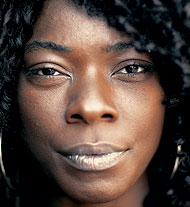 1.
I don’t speak Spanish much beyond hola / adios. Most of the time I don’t specifically know what Concha is saying.
But it don’t matter. I believe her anyway.
Why?
Because the way Concha sings, it sounds like her whole being be vibrating. Hell, I probably could listen to her sleeping, record it and listen to it over and over. (Damn, Kalamu, boy, you got it bad. So what? Far as I’m concerned, that’s good.)
1.
I don’t speak Spanish much beyond hola / adios. Most of the time I don’t specifically know what Concha is saying.
But it don’t matter. I believe her anyway.
Why?
Because the way Concha sings, it sounds like her whole being be vibrating. Hell, I probably could listen to her sleeping, record it and listen to it over and over. (Damn, Kalamu, boy, you got it bad. So what? Far as I’m concerned, that’s good.)
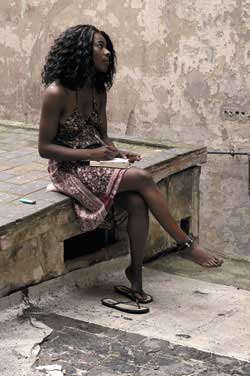 2.
María Concepción Balboa Buika, born 1972 in Palma de Mallorca. Palma is the capital city of the Spanish island of Mallorca, the largest of Spain’s Balearic islands located in the Mediterranean Sea. Concha was reared in a gypsy neighborhood. Her parents are from Equatorial Guinea.
And that’s about all the facts I know regarding Ms. Buika’s background and personal life.
Oh, I know she is one hell of a vocalist.
2.
María Concepción Balboa Buika, born 1972 in Palma de Mallorca. Palma is the capital city of the Spanish island of Mallorca, the largest of Spain’s Balearic islands located in the Mediterranean Sea. Concha was reared in a gypsy neighborhood. Her parents are from Equatorial Guinea.
And that’s about all the facts I know regarding Ms. Buika’s background and personal life.
Oh, I know she is one hell of a vocalist.
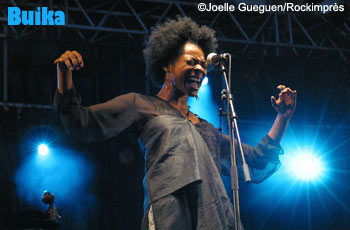 3.
She started her career where many singers stop. Early on Miss Lady was a House Diva. Wrote and sung bunches of club songs that charted throughout Europe. “We Play House Music” is self-explanatory. “Everyday” rather than straight-up house actually sounds closer to a jazz track with a dance floor flava.
I don’t know why, but rather than continue going with what was working, Concha set off in other directions. She traveled to London and did a gig in Las Vegas for a hot minute.
Much to the disappointment of legions of club goers, Ms. Buika pulled up stakes and split. Concha left House far behind.
3.
She started her career where many singers stop. Early on Miss Lady was a House Diva. Wrote and sung bunches of club songs that charted throughout Europe. “We Play House Music” is self-explanatory. “Everyday” rather than straight-up house actually sounds closer to a jazz track with a dance floor flava.
I don’t know why, but rather than continue going with what was working, Concha set off in other directions. She traveled to London and did a gig in Las Vegas for a hot minute.
Much to the disappointment of legions of club goers, Ms. Buika pulled up stakes and split. Concha left House far behind.
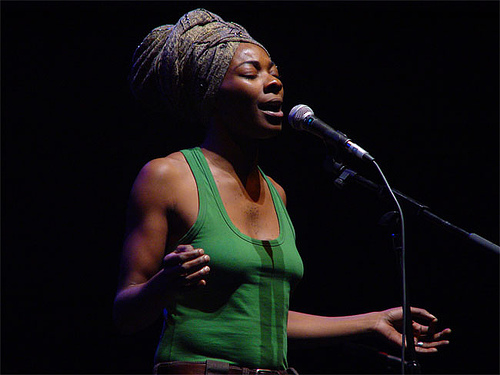 4.
There is a little known album—funny, here is a singer who is relatively new on the scene but she has scored with two successive albums and somehow has managed to have a secret debut album. Most online biographies don’t even mention Mestizuo.
Mestizuo is almost a great album. She has great phrasing as a jazz vocalist and an absolutely unerring sense of rhythm and pacing to go with her beguiling, raspy voice that is both surprisingly strong and extraordinarily agile.
Mestizuo sounds like a demo rather than a full-fledged album. Most of it is a duo with pianist Jacob Sureda who is absolutely masterful with his sensitive accompaniment, subtle and always interesting harmonic variations, and a soft touch that gives the music a floating quality supporting Concha’s airy flights.
If Concha’s grasp of English had been stronger, this would be an outstanding recording. Although it was released in 2006, after her rise as a House Diva, most of the recording was done in 2000.
I am perplexed how it is Concha got so deeply into jazz. Even when she mangles the syntax (especially noun/verb agreement), she nevertheless gets to the feel of jazz. Listen to how she concludes “My One And Only Love.” That closing phrase is absolutely gorgeous. It’s not easy to do, and it's even more difficult to conceive of.
If you listen to her albums in chronological order, Mestizuo is an auspicious starting point but it’s also a feign because just like Concha left the House, she also skipped out on being a Smooth Jazz lounge act.
I don’t know but I get the feeling Concha has diverse musical interests, a seemingly inexhaustible ability to work different genres, and most probably an insatiable hunger and unquenchable passion for singing. I also get the feeling that Mestizuo was not meant to be a debut album. But all of that is speculation. Again, what is factual is that the sister can naturally sing. She is a true multicultural wonder. House to jazz is no easy transition and yet, after acing one leap, instead of settling Concha stays on the move.
4.
There is a little known album—funny, here is a singer who is relatively new on the scene but she has scored with two successive albums and somehow has managed to have a secret debut album. Most online biographies don’t even mention Mestizuo.
Mestizuo is almost a great album. She has great phrasing as a jazz vocalist and an absolutely unerring sense of rhythm and pacing to go with her beguiling, raspy voice that is both surprisingly strong and extraordinarily agile.
Mestizuo sounds like a demo rather than a full-fledged album. Most of it is a duo with pianist Jacob Sureda who is absolutely masterful with his sensitive accompaniment, subtle and always interesting harmonic variations, and a soft touch that gives the music a floating quality supporting Concha’s airy flights.
If Concha’s grasp of English had been stronger, this would be an outstanding recording. Although it was released in 2006, after her rise as a House Diva, most of the recording was done in 2000.
I am perplexed how it is Concha got so deeply into jazz. Even when she mangles the syntax (especially noun/verb agreement), she nevertheless gets to the feel of jazz. Listen to how she concludes “My One And Only Love.” That closing phrase is absolutely gorgeous. It’s not easy to do, and it's even more difficult to conceive of.
If you listen to her albums in chronological order, Mestizuo is an auspicious starting point but it’s also a feign because just like Concha left the House, she also skipped out on being a Smooth Jazz lounge act.
I don’t know but I get the feeling Concha has diverse musical interests, a seemingly inexhaustible ability to work different genres, and most probably an insatiable hunger and unquenchable passion for singing. I also get the feeling that Mestizuo was not meant to be a debut album. But all of that is speculation. Again, what is factual is that the sister can naturally sing. She is a true multicultural wonder. House to jazz is no easy transition and yet, after acing one leap, instead of settling Concha stays on the move.
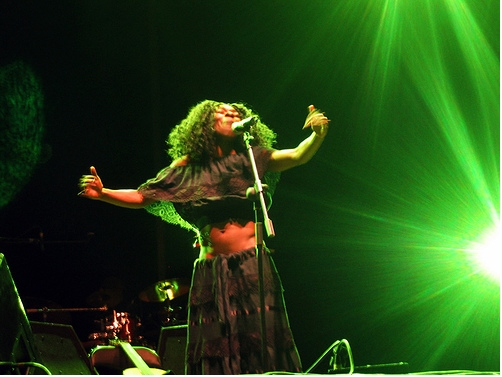 5.
From here on in, I’m mostly telling you what I feel because my 200-plus collection of flamenco albums and my decades-long interest in the Spanish music notwithstanding, I don’t “know” diddley about flamenco.
So after burning down the house and peeping jazz standards, Concha produces two albums in quick succession. Buika and Mi Nina Lola (2007).
Buika mixes contemporary production techniques with modern flamenco. It is very strong, indeed, I might say super-strong except it is no match for Mi Nina Lola, which mixes flamenco and jazz using acoustic instruments.
So when Concha digs her roots we get flamenco and jazz with touches of contemporary, hip-hop influenced pop. Again, it is both totally unexpected and totally delightful. The material is first rate. The arrangements are both appropriately and paradoxically both spare and simultaneously rich. The conceptual beauty and handsome execution notwithstanding, the real unifying chord is Concha Buika’s exquisite vocal work.
I had a hard time choosing the feature song. Finally, I boiled it down to “Nostalgias” and “Mi Nina Lola.” “Lola” got the nod simply because it is her major hit throughout Spain even among hardcore flamenco critics. One man noted he disliked the strings but absolutely adored the singing.
One other small note: Concha’s judicious use of English phrases as hooks and as part of choruses helps non-Spanish speaking listeners relate to her music. I don’t think it’s accidental but at the same time I don’t think it is a commercial calculation.
I think Concha Buika is genuinely and deeply smitten by jazz and evidences it throughout her recordings. In many ways she represents one of the most authentic black diaspora voices in contemporary music. Or as she notes in “New Afro Spanish Generation,” her anthem from Buika, she represents a quiet revolution. Go here to see her video for “New Afro Spanish Generation.”
5.
From here on in, I’m mostly telling you what I feel because my 200-plus collection of flamenco albums and my decades-long interest in the Spanish music notwithstanding, I don’t “know” diddley about flamenco.
So after burning down the house and peeping jazz standards, Concha produces two albums in quick succession. Buika and Mi Nina Lola (2007).
Buika mixes contemporary production techniques with modern flamenco. It is very strong, indeed, I might say super-strong except it is no match for Mi Nina Lola, which mixes flamenco and jazz using acoustic instruments.
So when Concha digs her roots we get flamenco and jazz with touches of contemporary, hip-hop influenced pop. Again, it is both totally unexpected and totally delightful. The material is first rate. The arrangements are both appropriately and paradoxically both spare and simultaneously rich. The conceptual beauty and handsome execution notwithstanding, the real unifying chord is Concha Buika’s exquisite vocal work.
I had a hard time choosing the feature song. Finally, I boiled it down to “Nostalgias” and “Mi Nina Lola.” “Lola” got the nod simply because it is her major hit throughout Spain even among hardcore flamenco critics. One man noted he disliked the strings but absolutely adored the singing.
One other small note: Concha’s judicious use of English phrases as hooks and as part of choruses helps non-Spanish speaking listeners relate to her music. I don’t think it’s accidental but at the same time I don’t think it is a commercial calculation.
I think Concha Buika is genuinely and deeply smitten by jazz and evidences it throughout her recordings. In many ways she represents one of the most authentic black diaspora voices in contemporary music. Or as she notes in “New Afro Spanish Generation,” her anthem from Buika, she represents a quiet revolution. Go here to see her video for “New Afro Spanish Generation.”
 6.
Progress. Collective. Multi-cultural. That’s the way the black world is moving. Has to move. We are too diverse to otherwise be able to stick together. Concha Buika is pointing the way forward. Embracing cultural elements foreign to her birth on the one hand while on the other hand remaining true to the culture in which she was reared, all the while affirming her African identify.
That’s our future, y’all. Either we will forward together, embracing each other, or we will fall apart. This is beautiful music reflecting the beauty of our diversity. Ole!
—Kalamu ya Salaam
An interesting musician
Interesting music from an interesting musician. Very interesting music, actually. The first thing I notice about Concha, as Kalamu noted, is her voice. There's all of that power mixed with the smoky raspiness. Plus, there's an agility in the way she negotiates her vocal runs. Concha is a very talented singer.
The second thing I notice is the "Spanish" sound that runs through all of her music. I know even less about flamenco than Kalamu, but I do hear how that kind of stomping rhythm that I associate with music from Spain often shows up in Concha's music. But in her case, it's very varied because sometimes it's there full-on, sounding almost like straight-up flamenco, but then other times, it's so subtle it's a virtual suggestion instead of a sound.
And last, I notice the experimentation. I notice how she seems unsatisfied with settling into one particular style or technique. Consistent with my prejudices, I don't like the more club-sounding stuff, but I enjoyed all the rest of it. And the feature track, "Mi Nina Lola," is fantastic, strings and all.
—Mtume ya Salaam
6.
Progress. Collective. Multi-cultural. That’s the way the black world is moving. Has to move. We are too diverse to otherwise be able to stick together. Concha Buika is pointing the way forward. Embracing cultural elements foreign to her birth on the one hand while on the other hand remaining true to the culture in which she was reared, all the while affirming her African identify.
That’s our future, y’all. Either we will forward together, embracing each other, or we will fall apart. This is beautiful music reflecting the beauty of our diversity. Ole!
—Kalamu ya Salaam
An interesting musician
Interesting music from an interesting musician. Very interesting music, actually. The first thing I notice about Concha, as Kalamu noted, is her voice. There's all of that power mixed with the smoky raspiness. Plus, there's an agility in the way she negotiates her vocal runs. Concha is a very talented singer.
The second thing I notice is the "Spanish" sound that runs through all of her music. I know even less about flamenco than Kalamu, but I do hear how that kind of stomping rhythm that I associate with music from Spain often shows up in Concha's music. But in her case, it's very varied because sometimes it's there full-on, sounding almost like straight-up flamenco, but then other times, it's so subtle it's a virtual suggestion instead of a sound.
And last, I notice the experimentation. I notice how she seems unsatisfied with settling into one particular style or technique. Consistent with my prejudices, I don't like the more club-sounding stuff, but I enjoyed all the rest of it. And the feature track, "Mi Nina Lola," is fantastic, strings and all.
—Mtume ya Salaam
This entry was posted on Sunday, September 23rd, 2007 at 12:43 am and is filed under Contemporary. You can follow any responses to this entry through the RSS 2.0 feed. You can leave a response, or trackback from your own site.
7 Responses to “CONCHA BUIKA / “Mi Nina Lola””
September 23rd, 2007 at 7:00 am
Oh my! I listened to Concha Buika first thing this morning. While I was listening to it, I had to write this http://www.organissimo.org/forum/index.php?showtopic=36317&hl= This is wonderful stuff, right up my street. I do believe, as you clearly do also, that the way forward, for music and for people and the world, is to join together. But when I listen to many of these "cross-cultural" things, I’m usually disappointed by how artificial they sound. To my mind, they’re what I call "Arts Council" music; kind of politically correct assemblages of people who may very well admire each other’s music but who can’t really get it together. It doesn’t seem to matter, to me, how good the music that comes out the other end is – and sometimes it’s very good – it sounds artificial, compared with the music that is produced for the specific "home audience", whether that’s Mali, Cuba, Senegal or wherever. Concha Buika’s music isn’t artificial in any sense that I can detect. Is this because she herself is a product of different cultures: Central Africa; Majorca (and its clubs); Spain? I don’t know. I just know this has moved me like I haven’t been moved since first hearing Ursula Rucker. I have three of Concha’s albums on order now; not the House effort – couldn’t find that on sale. Is that one of those things you can only get in the underground dance network? Thank you, thank you. MG
Give Me More, Give Me More!
Thanks for your note and for you blog. It’s a beautiful example of passing it on. A couple of quick things:
1. As for getting her house and dance tracks. There is no single album that collects those cuts. Indeed, it would probably take four or five cds if all the version were included. She has an amazing body of dance music produced between 2000 and 2005. Here is the best discography I have found so far: http://www.discogs.com/artist/Concha+Buika
2. I must correct myself. From what I can piece together, the jazz album was actually recorded prior to the house hits. I’ve just not been able to find a definitive biography. I’m still going through her dance music output and finding some beautiful moments in her work. Often the songs start off as straight house but then by mid-point other elements have been added or inserted. It’s clear to me that she is bringing a different vision to the music scene than what is now dominate. I don’t know of any other vocalist who is equally good doing house, jazz, flamenco, and contemporary pop.
Again, thanks for spreading the word about Concha Buika and about BoL.
—Kalamu
September 23rd, 2007 at 1:45 pm
Hi! It’s nice to read about a Spanish singer out of Spain 🙂 I saw Concha in 2006 (Palau de la Música, Barcelona) and I was impressed by her energy, kindness and sense of humor on stage. I never payed her any attention until she released Mi Niña Lola (wich is a popular song of a popular spanish music genre called ‘copla’). I use to listen to flamenco, I like the essence of it, when it sounds raw. From some time on, flamenco fusion is growing popular in Spain, but, in my opinion, it’s weak, commercial, easy to listen to in a negative way. But when I heard Concha I thought that was really fusion, that was really new and fresh, taking the inner soul of flamenco (soul of flamenco… jajajaja), mixing it with sounds of Africa, with the drama of any copla song lyrics, singing as if Lady Day was born Heredia or Montoya. So I couldn’t resist. She won 🙂
One thing I disagree is the point about English phrases. I don’t think she is doing that for an English audiende. As a non-English speaking listener I can say that we don’t need non-English phrases to relate with the music we listen to (in fact, we don’t find that lines anywhere…). I think that when she sings in English is because she changes and mixes genres, she mixes the natural languages of that genres. So if she wants to use the colour ‘soul’ in the canvas of a song, she sings in English, and she paints in colour ‘flamenco’ using the Spanish brush. Well, that’s my opinion.
Anyway, nice post, and always nice blog!
un abrazo!
September 24th, 2007 at 12:45 pm
Okay…I like music and I can appreciate her singing, but I guess I’m not “In Love with her [music]” as some of you are. 🙁 I mean you guys posted 15 tracks from her. That’s gotta be a BOL record. That clearly beats Sara Tavares and possibly ties Nina Simone in BOL postings. 🙂
CONCHA BUIKA has a rich, sultry voice. Her phrasing is clearly latino and in some cases dramatic in style. With that, I was a little put off by the first songs of hers in the jukebox. The mechanization of the club mix makes her voice choppy and too synchopated. I don’t know if it would be called slightly overproduction, but it doesn’t sound natural for some reason. For the other songs, ‘My One And Only Love’ and ‘Nostalgias’ are great. ‘New Spanish Afro Generation’ is excellent. Mi Nina Lola is okay, sentimental in parts (and I probably speak less Spanish than Kalamu).
September 26th, 2007 at 2:21 am
I think Fermenta made a good point there: that Concha is using the different languages of the genres she is mixing, not trying to make hooks for an English-speaking audience. I had another thought, late last night. This is a quote from the UNESCO General History of Africa vol III: “Africa from the Seventh to the Eleventh Century”, pp 143-145, edited by I Hrbek “Throughout the Moslem world of the Middle Ages, people not only enjoyed occasional indulgence in verse writing and philosophical discussion, but also enjoyed drinking, singing and dancing, especially at the courts. The djariyas [note the similarity of the word to the Mandinke word djeliya], trained in the singing and dancing schools of Medina and Baghdad, were much sought after and their price sometimes involved stupendous sums. Famous composers were similarly sought after. One of these was Ziryab (789-852), a lack mawla of the Abbasids. After spending some time in Kayrawan, he went to Cordoba at the invitation of al-Hakam I (796-822). Ziryab brought profound changes to the customs of the court and the ruling class in society and became the arbiter elegantiae for it. His music, aided by certain instrumental improvements of his own invention, soon replaced all the old melodies and has lived on through the centuries until today. The maluf, which is still in fashion in the Mahgrib today, and Spanish flamenco are remotely descended from the revolution brought about in music by Ziryab.” So maybe Concha isn’t sailing too far from African shores in joining Flamenco with other, more obviously African-influenced music. MG
kalamu sez
i’ve given some thought to the observations about concha’s use of english. let us not isolate concha’s use of english only to the flamenco phase. concha spent some time in las vegas and the jazz album seems to have been cut during that period. on that album there are nine tracks, four of them are in spanish but those four tracks are short. so most of the time she is singing in english. almost all of her house recordings are in english. she is an extraordinary musician who embraces a wide range of musics. i do not think we can fully understand her by only concentrating on one phase (which, in retrospect, is a mistake i made by giving so much space to her "flamenco" oriented material). obviously, a number of us are very impressed by concha, impressed with her ability to merge the traditional with the contemporary. i look forward to what she does next, and after that, and so forth and so on… to be continued.
—kalamu
###
October 3rd, 2007 at 11:01 pm
kalamu,
Great post – and just what I was looking for (and couldn’t find) last spring, when I posted a couple of tracks by her on my MP3 blog. (Here’s the link: http://spinninginair.blogspot.com/2007/05/flamenco-africano.html )
I honestly don’t understand why she’s getting zero promotion here in the US, what with the large potential Spanish-speaking audience…. and everyone else (like you and me). Agreed completely on her using various languages like colors on a painter’s palette; I don’t see it as an attempt at “crossover” marketing at all.
She really is unique, and – like Goldberg – she knocked my socks off. (BTW Goldberg, fancy meeting you here! ;))
October 28th, 2007 at 9:21 am
Two nights ago I was dragged to a concert in my hometown, Brooklyn, by a friend who is a journalist and had free tickets. What happened in that theater was truly magical. Buika is a phenomenon. She was generous, grateful and loving and thrilling. The musicians that backed her were also amazing (particulary her pianist and the guitarist). The following day I downloaded the two albums I could find (Buika and Mi Nina Lola) and listened to them over and over. I’m no expert on any form of music, but I want to say that as much as I enjoy the recorded music, her presence live was totally electric. The immediacy and generosity of that performance was something I won’t forget. Buika sings and wails from her toes up. She lives a song in performance. Personally, I think the concert hall is where she belongs – but this may be my own bias for the raw emotion of an artist not being filtered through a producer and rhythm tracks etc. She is a true musician with impeccable technique married to a style that I found truly original. I only mention this to say that if you have a chance to see her live, do NOT miss it. If you enjoy her recordings, you’ll be wrecked by her in concert.
October 22nd, 2010 at 3:58 pm
Hello
I just had the pleasure of hearing your music for the first time.
I must admit I had to google you to see a pic and you are as beautiful as you sound 🙂 WoW
Leave a Reply
| top |